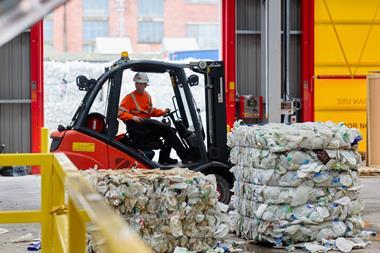From Jim Naismith
University chemistry is in crisis. Many people, including myself in a Chemistry in Britain Comment [May, 2002], warned that on our current course we were headed towards this.
Increased transparency of costing would reveal chemistry to be an expensive loss maker, coupled with the decreasing undergraduate and postgraduate numbers the situation would become critical. Why should cash-strapped universities following (S)HEFC funding formulas tax successful history departments to pay for chemistry? It’s perverse to argue that they should. I urged then and urge now for our community to seize control of our destiny. We need to change the funding for science, the [UK] government does not pay enough for experimental science. The per-head funding cuts have hurt science more than the arts since labs have fixed costs, not easily reduced. Until we persuade the government of this fact, financial pressure will continue to mount. We now need to restructure ourselves to become more efficient.
I suggested in The Times Higher Educational Supplement [23 May 2003] a hub (full service) and spoke (excellence in one area) model, but there may be better models. What is not a model is the one currently being tried in a number of universities, which is to maintain departments covering all areas [of science]. This strategy has and is demonstrably failing, the nightmare solution I predicted of the silent bleeding down of chemistry departments has found us. Those on the inside know several departments in the UK that are reducing numbers or have stopped hiring [academic staff]. It seems only when the last act is played out, the public closure announcement, does anyone notice and the RSC act. By then it’s way too late for departments whose fate was sealed years before. Even worse than this special pleading is failed special pleading, as happened over King’s College, London. It makes us look weak, defensive and bereft of vision.
I end with a plea to heads of chemistry departments to sit down and try to come up with something better than the hub and spoke model. If you can’t or won’t do something, then most likely the UK will be left with 10 to 15 universities with chemistry departments. The remaining 90 universities will in time have no chemistry at all.
J H Naismith CChem FRSC
By e-mail
From Lee Higham
For a while now I have thought that it is about time the RSC became more vocal, even more supportive of its members and perhaps more controversial.
I have my own views of course on many issues such as GM food and would quite happily debate these with someone holding an opposing opinion, but the RSC (and it’s not alone in the sciences) appears to me to carry out its role in these controversial issues in the way a chemist would go about a research project ie in an objective fashion, highlighting the various pros and cons of the argument. While this is of course necessary and instructive I feel sometimes ’the next step’ is missing - to provoke debate between chemists themselves and to communicate with the public. As a recent beneficiary of the RS [Royal Society] Science and MP pairing scheme, a recurrent theme among politicians in their opinion is that when a controversial subject breaks in science, the respective professional bodies ’sit on the fence’, due I feel to the point I made above. The escape clause used by science for years - that it is up to society to decide how to use our new developments is no longer sufficient - we can see the situation from many angles better than most and it is now not enough just to state that fact alone! I feel we have a responsibility to present (after debate) a unified conclusion about a particular subject relevant to us (such as ozone depletion for example) and present to society the opinion of our collective body. There would be dissenters among us, of course but that is preferable to what appears to be silence at present. I am aware the RSC has many close ties with parliament and acts in a subtle advisory role when called upon, but can we hold our hands up and honestly say we are anywhere to be seen when such a controversy appears in the headlines?
There is at present a lot of frustration about our status with the public and about our job security and future prospects. In addition to the crucial roles already played by the RSC I urge it to become more vocal, supportive and even controversial to meet better these aims.
L Higham MRSC
By e-mail
From Robin Clark
Chemistry is a core subject, around which numerous interdisciplinary subjects such as geochemistry, biochemistry, materials science, nanotechnology have been, or are being developed. Many others are in their infancy: thus the spectroscopic investigation of artwork, which I have pioneered, is now a rapidly expanding field, providing vital information on the pigments present on artwork and thereby on restoration, conservation, dating and authentication. Our critical identifications of indigo on the Lindisfarne Gospels etc indicated that the date of first importation of lazurite was over 200 years later than thought, of synthetic anatase on the Vinland map demonstrated that the Map is a forgery, of lead tin yellow on a Dutch painting helped to authenticate it as the 36th Vermeer, and of Prussian and ultramarine blues on early postage stamps (worth up to £1 million) established a basis for detecting forgeries in philately. This is thrilling work!
Numerous other exciting fields doubtless remain to be opened up, but you need chemists to do this research.
Without major investment in chemistry to retain, and properly to fund, long established departments, the UK will have the qualified manpower neither to recognise the significance of, nor to respond effectively to new and wholly unexpected discoveries, leading ultimately to the impoverishment of the nation.
R J H Clark FRS CChem FRSC
University College London, UK












No comments yet